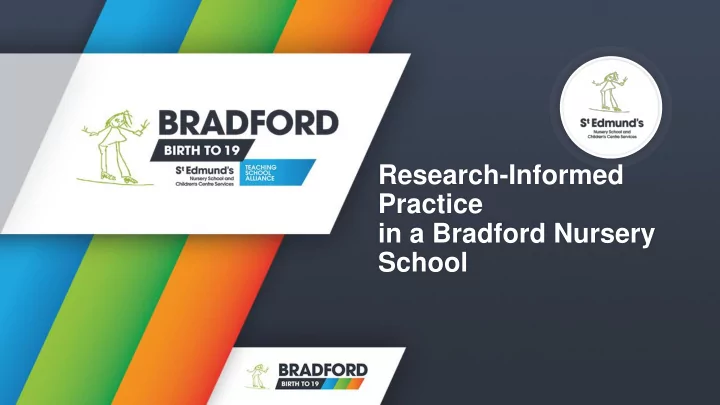

Research-Informed Practice in a Bradford Nursery School
• Research-Informed Practice in a Bradford Nursery School • Two significant projects have been developed at St Edmund's Nursery School and Children's Centre during the past two years, St Edmund's Strategy for High Risk Children and 50 Things To Do Before You're Five. Both were developed using peer-reviewed research that indicated potentially positive outcomes for our communities of families and their children, and both areas of work were included in the Bradford Birth to 19 Teaching School's successful DfE funded, £1m SSIF bid to work in early years. • This workshop will detail the practice, both at St Edmund's and as part of the SSIF Project, and share early indicators of impact. It will also explore some of the challenges we have experienced, and share case studies that illustrate impact.
The St Edmund’s Approach In October 2017 the Education Endowment Foundation and Public Health England published a document entitled - Early Language Development: Needs, provision and intervention for preschool children from socio-economically disadvantaged backgrounds.
“Children with problems only with expressive language (the ability to use words and use words and sentences) and not with receptive language (the ability to understand what is said) are particularly likely to ‘grow out’ of their difficulties.” 4
“However, as well as children ‘growing out’ of their difficulties, it is also clear that some children can ‘grow into’ them, appearing to have a good start but then falling behind their peers later in development. Again, this ‘late emerging’ group was evident in children between 18 and 30 months, 3 and 5 years and 4 and 6 years. Approximately half of the children in the Early Language in Victoria Study with difficulties at 4 years were ‘typical talkers’ at age 2. This complex picture of individual variability in preschool language development pathways is one of the key challenges for the design of preventative services”. 5
“Most screening instruments focus only on the child and not on the wider social determinants of language difficulties. Recent studies have demonstrated that supplementing such tools with additional information about family and parenting factors could increase their predictive validity.” 6
Identifying High Risk Children • Well Being (Low, Medium or High) • Involvement (Low, Medium or High) • Language, 12 months behind expectations • Concerns about home circumstances (recent separation, bereavement, parent disabled etc.) 7
ACE (Adverse Childhood Experiences) Children Following the publication of the document: Early Language Development: Needs, provision and intervention for preschool children from socio-economically disadvantaged backgrounds. (Education Endowment Foundation and Public Health England October 2017) and our knowledge and understanding of the impact of ACEs, we screened the children to identify those meeting all three criteria (low wellbeing/ involvement, delayed language and communication and concerns about home circumstances). 8
This allowed us to select a group of children who needed more than Quality First Teaching to support their development. An Individual Oracy Plan is created for these children and they are provided with targeted support. We can see some progress from February 2018 when these plans were implemented to October 2018 (or July if they left to go to Primary School). It is apparent that those children with poor attendance are not making the progress we had hoped. We are continually identifying ways to improve attendance. 9
Case Studies Shahida – 5 terms leaving July 2019 Good attendance Continuing 2018-2019 – no longer on the high risk list reviewed October 2018 but still closely monitored 10
How skilled are your staff team in the following areas? • Understanding of self-regulation • Understanding of typical language development • Listening to and observing children (giving whole attention, eye contact, smiling) • Sharing stories, singing songs and rhymes • Turn taking, (authentic) conversations, open questions, extending and developing vocabulary • Sustained shared thinking – where adult and child share joint attention following the child’s interests and motivations • Providing a running commentary to display thought processes (adult modelling their own thinking or what the child is doing) • Pretence and symbolic play – planning, organising and rehearsing roles. 11
The family is the most effective and economical system for fostering and sustaining the development of the child. The involvement of the child’s family as an active participant is critical to the success of any intervention programme ... The involvement of the parents as partners in the enterprise provides an on- going system which can reinforce the effects of the programme while it is in operation, and help to sustain them after the programme ends. Bronfenbrenner 1974 12
50 Things to Do Before You’re Five • Experiential Learning Theory (Kolb) • Social Interaction Theory (Vygotsky, Bruner) • Every parent wants better for their child • Initial funding from Big Change • Sustainability via grant funding applications (SSIF, EEF, National Lottery, Red Nose etc…) • Sustainability via buy-in from local authorities and public health • Ongoing practitioner action research 13
Early findings on engagement… • Universal support from agencies, professionals and schools • Majority of parents say they really like the resources, but app downloads increase with support • Highest downloads in BSB/BHT/SSIF areas • A few parents report that ‘we do this already’ or ‘we’ve done all the activities’
15
App downloads at 18 February 2019 180 160 140 120 100 80 60 40 20 0 BD3 BD5 BD8 BD21 BD9 BD16 BD2 HX3 BD7 BD15 16
Insert council logo here. Please edit the slide master. Insert sponsor logo here. Please edit the slide master. 17
Insert council logo here. Please edit the slide master. Insert sponsor logo here. Please edit the slide master. 18
Demonstrating ‘promise’… • Partner bid to EEF with University of Leeds and Born in Bradford – unsuccessful, but encouraged to reapply • SSIF bid included interventions already described by EEF as ‘promising’ • Talking to DfE, Ministers, partners, and BBC #BBCWeAreBradford 19
Any questions? Anne-marie@stedmundsbradford.org.uk Andrea.Layzell@stedmundsbradford.org.uk Book Visitor Days here - https://www.stedmundsbradford.org.uk/training-and- consultancy/visitor-days Twitter Accounts @50TTDBradford @ MerifieldAnne @ AndreaStEdmunds 20
Recommend
More recommend